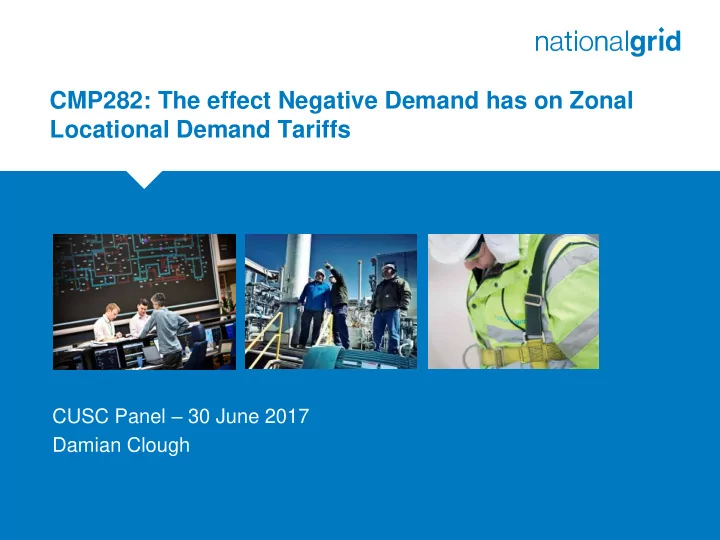

CMP282: The effect Negative Demand has on Zonal Locational Demand Tariffs Place your chosen image here. The four corners must just cover the arrow tips. For covers, the three pictures should be the same size and in a straight line. CUSC Panel – 30 June 2017 Damian Clough
Summary of Defect The Transport part of the DCLF model calculates a locational signal for each node on the network The locational signal reflects the affect on total flows on the system of adding 1MW of Generation at particular location. Demand locational signals are the inverse of Generation To create stability locational signals are weighted to create a zonal locational charge Negative Demand in Scotland has the affect of increasing the locational tariff in the opposite direction the underling locational signals indicate 2
Justification against Applicable CUSC Objectives (a) that compliance with the use of system charging methodology facilitates effective competition in the generation and supply of electricity and (so far as is consistent therewith) facilitates competition in the sale, distribution and purchase of electricity; Consumers in the North of Scotland, if tariffs are passed through by Suppliers will see an unjustified increase in their Electricity bills. If Suppliers choose not to pass this element directly on to the end consumer i.e. (Fixed tariffs) then this will harm competition. Although the defect currently affects consumers in the North of Scotland with the growth of Embedded Generation this could feasibly affect other parts of the country i.e. South West, Wales within 5 years . 4
Justification against Applicable CUSC Objectives (b) that compliance with the use of system charging methodology results in charges which reflect, as far as is reasonably practicable, the costs (excluding any payments between transmission licensees which are made under and in accordance with the STC) incurred by transmission licensees in their transmission businesses and which are compatible with standard condition C26 (Requirements of a connect and manage connection); Tariffs are meant to provide cost reflective signals. The tariffs currently for North of Scotland clearly do not reflect the underlying cost reflective signals. This may lead to increased Transmission expenditure funded by other users 5
Urgency / Self Governance There is the need for Urgency to meet Draft publication of TNUoS tariffs Although tariffs are finalised at the end of January Industry feedback through mods such as CMP244 indicate that Draft tariffs are a key publication. Likely to be more than one proposal so difficult to scenario plan Self Governance: No. The decision will affect the charging liability of a number of parties 6
Proposed Timetable: CMP282 Place your chosen image here. The four corners must just cover the arrow tips. For covers, the three pictures should be the same size and in a straight line. CUSC Panel – 30 June 2017 Heena Chauhan
CMP282 The Panel is asked to agree: How to progress CMP282 Workgroup Code Administrator Consultation 8
Code Administrator - Proposed Progression The Proposer does not believe that this Proposal meets the Self Governance criteria. The Proposer would like the Proposal to proceed following an Urgent timetable The Panel is therefore asked to agree: whether CMP282 should be progressed using either; Urgent CUSC Proposal timetable (with Workgroup) Standard CUSC Proposal timetable (with Workgroup) 9
Urgency Criteria Ofgem’s current view is that an urgent modification should be linked to an imminent issue or a current issue that if not urgently addressed may cause: a) A significant commercial impact on parties, consumers or other stakeholder(s); or b) A significant impact on the safety and security of the electricity and/or gas systems; or c) A party to be in breach of any relevant legal requirements. 10
Proposed Urgent Timetable for CMP282 22 June 2017 CUSC Modification Proposal submitted 30 June 2017 Modification Presented to the Panel 30 June 2017 Request for Workgroup Members (5 working days) w/c 10 July 2017 Meeting 1 via Webex to ensure Workgroup members have a fully understanding of the context of the modification w/c 17 July 2017 Meeting 2 & Meeting 3 - Finalise Workgroup Report 24 July 2017 Workgroup Consultation issued to the Industry (10WD) w/c 14 August 2017 Workgroup view consultation responses and agree options w/c 28 August 2017 Workgroup agree legal text and vote 21 September 2017 Workgroup Report issued to CUSC Panel CUSC Panel meeting to discuss Workgroup Report 29 September 2017 Code Administration Consultation Report issued to the Industry 2 October 2017 (10WD) 18 October 2017 Draft FMR published for industry comment (3 Working days) 19 October 2017 Draft Final Modification Report issued to Panel 27 October 2017 CUSC Panel Recommendation vote 3 November 2017 Final Modification Report issued the Authority 1 December 2017 Decision implemented in CUSC 11
Proposed Standard Timetable for CMP282 22 June 2017 CUSC Modification Proposal submitted 30 June 2017 Modification Presented to the Panel 30 June 2017 Request for Workgroup Members (10 working days) Meeting 1 via Webex to ensure Workgroup members have a fully w/c 24 July 2017 understanding of the context of the modification w/c 7 August 2017 Meeting 2 w/c 14 August 2017 Meeting 3 w/c 29 August 2017 Circulate draft Workgroup Report w/c 4 September 2017 Workgroup meeting to agree Workgroup report 18 September 2017 Workgroup Consultation issued to the Industry (15WD) w/c 23 October 2017 Meeting 4 Workgroup view consultation responses w/c 13 November 2017 Meeting 5 Workgroup vote 17 November 2017 Modification concluded by Workgroup 24 November 2017 Workgroup Report presented to Panel 27 November 2017 Code Administration Consultation Report issued to the Industry (10WD) 12 December 2017 Draft FMR published for industry comment (3 Working days) 12 December 2017 Draft Final Modification Report issued to Panel (late paper) 15 December 2017 Modification Panel decision 18 December 2017 Final Modification Report issued the Authority 29 December 2017 Decision implemented in CUSC 12
Recommend
More recommend